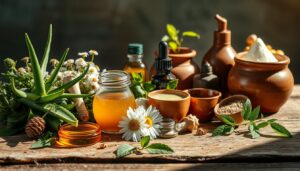Getting a vibrant complexion is more than just skin care. It shows how well you take care of your body’s biggest organ. By exploring radiant skin secrets and glowing skin tips, you’ll learn a holistic way to enhance your natural beauty. This approach goes beyond makeup, focusing on the true skin health.
In this guide, we’ll show you how to know your skin type. We’ll also talk about the importance of the right nutrients. Plus, we’ll cover both old and new methods to get that bright, glowing look.
Key Takeaways
- Understanding your unique skin type is the first step to a tailored skin care routine.
- Natural remedies can be powerful allies for maintaining skin health.
- Nutrition and hydration are essential for nurturing glowing skin from the inside out.
- Advanced skin care techniques, like exfoliation and serum application, are critical for boosting skin’s natural glow.
- Protecting your skin from the sun’s rays is key to keeping it glowing and healthy.
The Foundation of Skin Care: Understanding Your Skin Type

Essential Nutrients for Healthy Skin
Identifying Your Skin Type
The American Academy of Dermatology says there are important signs to look for. Oily skin is shiny, has big pores, and gets acne. Dry skin feels rough and looks dull or flaky.Combination skin is oily in the T-zone but dry on the cheeks. Sensitive skin gets irritated or red easily, even from some skincare routines.
Customizing Your Skin Care Routine Based on Skin Type
Dermatologists say your personalized skincare should match your skin’s needs. If you have oily skin, use products that won’t clog pores. Dry skin needs moisturizing products with hyaluronic acid.For combination skin, use different products for different areas. Sensitive skin should stick to gentle, fragrance-free items to avoid irritation.By following these personalized skincare tips, your skin will stay healthy and look great. Tailoring your care to your skin type helps it fight off environmental damage. So, it’s important to know your skin type and choose the right products for it.Getting glowing, healthy skin is more than just what you put on your face. What you eat is key. Foundational skin nutrients like vitamins for skin, antioxidants, omega fatty acids, and collagen are vital for vibrant skin.Vitamins A, C, and E are top vitamins for skin. Vitamin A helps repair skin by renewing cells. Vitamin C boosts collagen and fights off aging skin damage. Vitamin E works with C to protect against UV damage.Fats, like omega fatty acids, keep skin elastic and moist. Found in fish and flaxseeds, they strengthen the skin’s oil barrier. This barrier keeps skin hydrated and smooth, protecting it from pollutants.Antioxidants, like selenium and zinc, protect skin from damage and inflammation. They prevent early aging and help skin heal. Eating foods rich in antioxidants can make skin look better and feel firmer.Proteins that boost collagen production are also key. Collagen gives skin its structure and elasticity. Amino acids in protein foods and supplements build collagen and keratin, keeping skin strong.Adding these skin nutrients to your diet can change your skin’s look and feel. It can make your skin look younger and healthier. For more on how these nutrients rejuvenate skin, check out sources that back up their benefits.Natural Remedies and Their Impact on SkinThe charm of natural skincare remedies is growing fast. More people want gentle, effective ways to keep their skin healthy. Using herbal treatments and organic skincare products with botanical extracts is helping a lot. It’s good for skin health, thanks to old traditions and new science.Natural ingredients have always been key in skincare. Aloe vera was loved in Egypt for healing, and green tea in Asia for calming redness. These natural ways treat skin well and work.Science now backs up these old ways. Studies show that botanical extracts, like chamomile, really help soothe and heal skin. It’s a great choice for organically focused skincare.People are now choosing eco-friendly and effective products more. The rise of organic skincare shows we care about health and the planet. Natural and herbal treatments are key in today’s skincare.Adding botanical extracts to your skincare can make your skin look and feel better naturally. It’s why people have trusted these methods for so long. Using these natural ingredients helps our skin and the planet.Advanced Skin Care TechniquesExploring advanced skin care techniques opens up a world of ways to improve skin health. Methods like skin exfoliation, using facial serums and essential oils, and moisturizing deeply can change how your skin looks and feels.
The Role of Exfoliation in Skin Regeneration
Skin exfoliation is key to getting a brighter and clearer skin. It removes the top layer of skin, letting new cells come to the surface. This not only makes your skin look better but also helps it soak up other skincare products better.
Incorporating Serums and Oils for Enhanced Glow
Using facial serums and essential oils rich in active ingredients can greatly improve your skin’s glow. These products go deep into the skin, giving it the nutrients it needs. Choosing and applying them right can address specific skin issues like dryness or acne, giving you the best results.
The Importance of Moisturizing
Moisturizing is a must in any skincare routine. It keeps your skin hydrated, preventing dryness and flakiness. This helps slow down aging and keeps your skin glowing. Plus, it acts as a shield against environmental damage.By using these advanced techniques together, you can greatly improve your skin’s health and look. You’ll get a radiant, youthful glow that lasts.Unlock the Secrets to Glowing, Radiant SkinGetting glowing, radiant skin is a journey with many steps. It includes sun protection and stress management. Knowing how these steps work together helps you make a skin care plan that boosts health and energy.
Sun Protection: The Unsung Hero of Glowing Skin
Sun protection is key for healthy, young-looking skin. Using sunscreen with a broad-spectrum SPF every day is a must. It helps prevent photoaging and skin cancers.
The Impact of Diet and Hydration on Skin Health
Eating a healthy diet for skin full of antioxidants and hydrating foods is vital. Drinking lots of water keeps your skin elastic and soft.
Stress, Sleep, and Skin: The Invisible Connection
Managing stress and getting enough sleep are critical for clear skin. Stress can cause breakouts, while sleep helps your skin repair and refresh itself.ConclusionLet’s wrap up by thinking about the main secrets for natural beauty. Knowing your skin type and adding key nutrients are key. These steps are the base for glowing skin.Your skincare journey shows your commitment and smart choices. It shows how important it is to care for your skin. This care is vital for your skin’s health.We’ve talked about natural remedies and advanced methods like exfoliation and moisturizing. These can make your skincare routine better. Remember, a glowing complexion is more than just skin care.Protecting your skin from the sun, eating well, and managing stress are also key. These habits help your overall glow and health.In our final thoughts, remember that every step you take boosts your self-confidence and vitality. While products and practices are important, it’s the personal touch and consistent care that truly shine. Embrace your natural beauty and advocate for your skin’s needs.Carry forward the lessons learned to cultivate a radiant, healthy complexion. This will reflect your inner glow.FAQ
Q: How can I determine my skin type?
A: To find out your skin type, watch how it acts without makeup or products. Clean your face and wait an hour. Oily spots mean you have oily skin. Dry or flaky areas are dry skin. Combination skin has both oily and dry spots.The American Academy of Dermatology has more tips on skin types.
Q: What essential nutrients are vital for healthy skin?
A: Healthy skin needs vitamins A, C, E, and B-complex, omega-3 fatty acids, and antioxidants. They help repair and rejuvenate your skin. Dermatologists and nutrition experts can tell you more about these nutrients.
Q: Are natural remedies effective for skincare?
A: Yes, many natural remedies work well for skin care. Aloe vera, green tea, and chamomile are good for soothing and healing your skin. Studies and history back up their benefits.
Q: How does exfoliation help with skin regeneration?
A: Exfoliation gets rid of dead skin cells. This helps new cells grow and regenerates your skin. It makes your skin look brighter and more even, as dermatologists say.
Q: Can using serums and oils really improve my skin’s glow?
A: Absolutely! Serums and oils are full of active ingredients. They deeply nourish and hydrate your skin for a better glow. Beauty experts say adding them to your routine is key.
Q: Why is moisturizing important for skin health?
A: Moisturizing keeps your skin hydrated and elastic. It also protects your skin. It prevents dryness and aging, making it a must for your skin care routine, science shows.
Q: How does sun protection contribute to glowing skin?
A: Sun protection stops skin damage like sunburns and aging. Using sunscreen with the right SPF keeps your skin healthy and glowing, research proves.
Q: What role do diet and hydration play in maintaining healthy skin?
A: Diet and hydration are key for clear and hydrated skin. Eating right and drinking enough water helps your skin’s barrier. It improves your skin’s look and feel.
Q: Can stress and lack of sleep affect my skin?
A: Yes, stress and sleep affect your skin. Stress can lead to breakouts or dull skin. Good sleep helps your skin repair and stay young, studies show.




